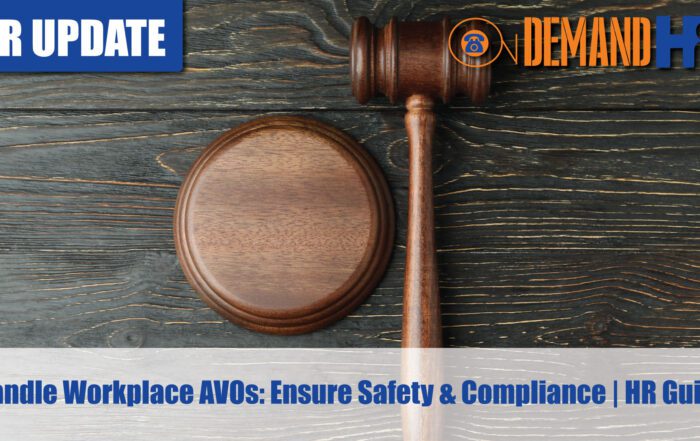Recruitment Tips & Strategies During A Pandemic
In Episode 5 of HR Fridays Clint talks to our Recruitment Leader & Specialist – Stephanie Joseph about current trends in the job market, the surprising challenges still faced by business to find good candidates despite Covid-19, and how the recruitment landscape has changed substantially in recent times.
Please see below for a full transcript of the video
Share the HR or workplace relations challenge facing your business and one of our experienced consultants will be in touch within 24 hours with a strategic action plan or discover the best strategy yourself by accessing out free online training library.
Transcript
Clint Indrele 0:15
Well, good morning ladies and gentlemen, welcome to another HR Fridays from On Demand HR every Friday here at 11:30am on Facebook and YouTube. We have a specific topic each week, as you know, let us know any future topics of interests. Let us know your comments. And please interact with us regarding HR Fridays, it is intended to be interactive, where we answer all questions that we can. The whole concept of HR Fridays is built around providing advice, which is reality, and a real understanding of risk, not just scaring you with stories about certain things and trying to let you know that there are employees coming for you trying to sue you or things like that. The whole concept of this HR Fridays is giving balanced and real advice, which is based on a real understanding of risk.
Clint Indrele 1:06
Today’s topic, however, is slightly different. We are talking about actually recruitment today and what we’re seeing in terms of current trends in the market. And today I’m talking with recruitment specialist and leader of On Demand Recruitment Campaigns. Stephanie Joseph, Stephanie, good morning.
Stephanie Joseph 1:22
Good morning.
Clint Indrele 1:24
How are you today?
Stephanie Joseph 1:25
Good. How are you?
Clint Indrele 1:27
Very well. Thank you very well, I’m really, really interested in what you’ve been up to of late, obviously, you’re leading On Demand Recruitment Campaigns. And we understand that you’ve, you’ve been quite busy of recent times. Just tell me in general terms, what are you seeing from clients? And what are some of the the general trends you’re seeing at the moment?
Stephanie Joseph 1:46
Yeah, we’re surprisingly quite busy. Obviously, with COVID. You know, it’s all this media scare around lack of jobs and unemployment, but we’re actually quite busy. I think clients are looking for alternatives to the standard recruitment service and looking at ways to try to cut that cost and trying to do that and do it themselves or find another alternative.
Clint Indrele 2:13
Yeah, fantastic. I think that’s a great intro into sort of what we wanted to talk to you about what to talk to you about today, actually. So really interested in some of your insights on, you know, trends. And I kind of wanted to break this down for our viewership in three main categories. So I might start with, first of all, highly mobile employees. And certainly one of the observations you shared with us Stephanie is that, you know, the majority of new hires leave in the first 12 months, unless there is progression, promotion, or salary increases. Tell us a little bit about that. What do you what are you seeing out there?
Stephanie Joseph 2:48
Um, well, it definitely goes into another topic of how you can retain your employees. But it also is characteristic of candidates on the current market where they’re obviously very impatient. And they move quite quickly and gone are the days of being able to sit around and wait for everyone to come in for a month, and then going back to review candidates.
Clint Indrele 3:12
That’s great to know and we spoke recently about some statistics around this. And I think it was something like 45% of candidates have been employed with their current employer for less than 12 months. Is that right?
Stephanie Joseph 3:27
Yeah, that’s right. And those that stayed, there was something along the lines of half of those only stayed because they were either promoted, or they were given some sort of a salary increase or additional benefits.
Clint Indrele 3:39
Yeah, that’s really interesting. So what you’re seeing on the recruitment front is you’re actually seeing a lot of the people who are applying for the roles that have been run by On Demand Recruitment Campaigns, you’re seeing a lot of candidates, that are at their current employers for, you know, 12 months or less and looking to move on.
Stephanie Joseph 3:55
Yeah, exactly. And you can sort of sit back and say, oh, short period of service, because most people are gonna have a short period of service.
Clint Indrele 4:04
Yeah, interesting. And it’s interesting how obviously, that’s changed significantly from from years gone by.
Clint Indrele 4:09
Let’s also talk about technology. So there’s also this concept of candidates being able to, you know, submit mass numbers of applications in a short period of time. Tell us a little bit about that, Stephanie, and talk us through the viewership as to you know, what are we seeing out there in respect to technology and how it applies to recruitment?
Stephanie Joseph 4:28
Yeah, so technology that they can upload their standard resume to platforms like Seek or Indeed and it’s as simple as hitting, hitting apply and their resume sent off to the board directly and their application submitted to you. They no longer sitting back and trying to customize their resume or their cover letter specifically to your job. They’re not placing value on your job. In particular, they can sit there on the lounge in front of the telly and apply for 20 or 30 jobs in a night easily. Just not viewing your your particular role as being the most important thing to them at the moment.
Clint Indrele 5:05
And what do you think that employers can do to adjust that are you seeing anything that they should be doing in terms of adapting to that style of candidate these days?
Stephanie Joseph 5:15
Obviously, you need to move quite quickly on that anyone that you have, that you have had come through that are a stronger candidate, base your opinion of their past experience only rather than things like how much effort they’ve put into their application to you specifically. Things like structure of your advertisement to make it easier for them to find what you are looking for specifically, so you don’t end up with masses of candidates that are, you know, not suitable and not meeting your expectations. There’s been quite a number of different changes that you need to do to adapt that sort of candidate.
Clint Indrele 5:54
Do you think employers? Do you think that they are ultimately, you know, coming to terms with the fact that their roles are not that special, the candidates don’t care about customizing their cover letters and CVS? What do you what are clients saying about these sort of things?
Stephanie Joseph 6:12
Oh, it’s mixed. Some, I think, have been bitten by this in the past and are starting to adjust to the new candidate on the market. But we still get feedback from from clients saying, this person doesn’t look like they put a lot of effort. There’s a spelling error in this one. This one doesn’t even refer to our job title, do they even know what the what the who they’re addressing in their cover letter. And they don’t it’s a standard template that’s uploaded to the job platforms. Partly, that’s probably the responsibility of the job platforms for allowing that to, you know, be uploaded so easily. But partly, and it’s just a characteristic of the current market.
Clint Indrele 6:53
Yeah. And whenwe had, you know, 8% unemployment back in the day or 7% unemployment back in the early 2000s. And now you’ve got really 5% unemployment. You know, would you say that? That’s one of the key differences. Is there just such a shortage of candidates now that candidates can afford to be that kind of, you know, blaze about about their applications?
Stephanie Joseph 7:17
Yeah, so pre COVID definitely 5% employment makes for a fairly restricted and limited talent pool. Um, but even now, even though we’ve got higher unemployment rates, we’re now competing with government initiatives, where, why would I go to work and earn an extra couple hundred bucks a week, and I can sit at home and earn a decent income for nothing?
Clint Indrele 7:38
Yeah, it’s really interesting. I think we talkin the other week about how how job seeker, I think was something around, you know, $400 a week at the present time. And yet we have clients advertising for part time and casual roles paying $600 a week, and they’re not being a whole heap of incentive for for those people to apply for those are those sorts of jobs, because it’s easier to be on the couch, so to speak, you find a little bit of that with certain roles?
Stephanie Joseph 8:05
Yeah, definitely. And I mean, we keep thinking it’ll change at the end of September, when the government initiatives expire, and then they get extended again. So it’s just pushing that out further and further, eventually, that’s going to change. But who knows when it is?
Clint Indrele 8:20
Yeah, no, that’s great. Staphanie, thanks for you thoughts on that technology side of things, and I guess the third thing I wanted to talk to you about was really around the skepticism or increased skepticism of cryptic and non branded ads, where there’s an ad with limited details about the job or ads that look like they’re just fishing for pools of candidates, what can you tell us about that?
Stephanie Joseph 8:40
Some of the feedback that we got from candidates is that when we’ve had clients try to advertise these sorts of roles where they don’t want to release the name of the company or the salary figures, for whatever reason, we find a they don’t get a lot of applications, and b candidates are skeptical of whether they’re even a legitimate advertisement. And what they’ve had in the past is that theve had recruiter is trying to build databases of active candidates as a selling point. And realistically, those candidates to try to apply for a job that doesn’t exist.
Clint Indrele 9:14
Yeah, that’s really interesting. Probably probably segue into the next kind of point about, I guess, where, you know, On Demand Recruitment campaigns is adapted to this current, you know, marketplace and candidate kind of attitude. And, you know, I guess potentially, we’re looking at this sort of new future of recruitment, let’s have a look at this, first of all, So, tell me, what are your views on, you know, company branding, first of all, and what what are some of your recommendations around what what businesses should be doing on on their adverts with respect to company branding.
Stephanie Joseph 9:53
So we always recommend that we’re quite clear and transparent with the candidates. Um, so you know, it, making it legitiment and making it quite clear to the candidate that this is a real opportunity, and we are looking to recruit somebody to our business. If you’ve got a good brand and a good reputation, why wouldn’t you sell that? And it also lets us sell the benefits of working for the company specifically. You end up with an ad, if you keeping it unbranded and I guess unclear as to what the role is, you’re not going to stand out in pages and pages of roles that are being advertised. If we can stick your logo on there, at the very least somebody’s going to scroll through, and they’re going to pick up your ad just because it stands out versus the others that don’t.
Clint Indrele 10:40
Yeah, that’s really interesting. My assessment of it and looking at this, quite frankly, is really, there’s there’s no downside of doing having a company branded ad and there’s there’s actually a lot of upside, because you are, you know, really putting that brand to the candidate, you’re celebrating the specific benefits of the brand. And, you know, I guess a cryptic or, you know, nameless ad fails to really deliver on that. Tell me about some job advertisement features. So what are the sort of things that you recommend to begin a job advertisement these days?
Stephanie Joseph 11:14
Well, obviously, you got to create something that looks professional and is pleasing to look at, I don’t think that’s really ever changed, that’s probably always been a prerequisite to putting together a good job ad. But the impatient candidate wants to be able to skim read the ad, and they rarely read something in its entirety. So it’s important to keep it short and sweet, where possible, and break it down so that they can if, if they’re looking for a company that sells a lot of benefits, point those out so that they can skim read the ad and pick them up, if they’re just looking for something that they meet the qualifications for, point that out so that they can skim read it and pick it up quickly.
Clint Indrele 11:52
Yeah, no, very good. What sort of things do you think is is appropriate? Like what sort of ad length do you think works well in terms of words? have you having any thoughts on that?
Stephanie Joseph 12:06
There’s some research out that says an ad of 150 to 300 words is the optimum length, that’s obviously quite significantly short. And not all ads are going to be able to meet that, obviously, depending on seniority and the duties and those sorts of factors. But if you can keep it as close to possible as that range.
Clint Indrele 12:28
Yeah, and look a lot of people are talking about social media, new passive engagement. I mean, this is just a fantastic topic to talk about. And, you know, with the market being so competitive these days, you know, it really isn’t enough to be just on the traditional job boards and just be advertising in the old ways. Tell me a bit about, you know, social media and passive engagement and what sort of things that businesses should be doing in this regard?
Stephanie Joseph 12:54
Probably leads back to the other point about employees being highly mobile at the moment and taking advantage of that. And people like us are able to use these tools to stick the job under the nose of a candidate who may not even have been looking things like posting on Facebook groups, or other social media platforms. And then you can also use tools like Seek Talent Search to, you know, a candidate may have recently placed with somebody and isn’t necessarily thrilled by the role, it isn’t exactly what they expected, you might pick them up a couple of months after they’ve already found new employment. And you’ve obviously got tools like LinkedIn as well.
Clint Indrele 13:36
Yeah, so what you’re saying, you’re trying to find ways of putting this specifically under the noses of people who aren’t looking on specific Facebook groups. Is that is that right? That’s the kind of strategy or approach you are taking?
Stephanie Joseph 13:50
Yeah, and you can obviously those groups that restricted to an area or location, or there’s some groups that, you know, mums and bubs pages, if you’re looking for somebody who’s part time, they might be looking to only work part time. And you’ve got accounting specific pages, for example, that you can post these roles to, and you end up with people that are sitting on their train on their daily commute, and scrolling through Facebook, and then this job pops up under their nose when they weren’t even looking.
Clint Indrele 14:20
Yeah. Just one final thing before we wrap up today, I just wanted to talk about review and action on applications because this seems to be another thing that’s quite important. And, you know, certainly with candidates being so impatient and being able to apply for lots of roles, it seems like the turnaround time for employers to respond is is much more urgent than ever. Can you just talk us through that briefly, Stephanie, and what some of your thoughts are on that?
Stephanie Joseph 14:49
Yeah, not only are they impatient, which means if they don’t get a response, they’re going to continue to apply the 20 roles a night and keep, you know, trying to get other opportunities come their way. You also have candidates who are sitting there waiting for you to engage with them. They’re not necessarily following you up. You also have a competitive market where if you don’t respond to somebody who’s good, they may be offered a competitive role in the meantime, and you may end up with nobody at all.
Clint Indrele 15:24
And what sort of time frame? Are you seeing that, you know, you really need to respond like, how quickly are these candidates expecting contacts following application?
Stephanie Joseph 15:34
We try to make sure that we are responding to, you know, at least screening a resume within the first 24 hours. After that, obviously, you can do your phone screen. And we do find that if you don’t follow up with an interview shortly after that time, within a couple of days, they’ve got another offer on the table or or they’re going for other interviews that basically not sitting around waiting for you.
Clint Indrele 15:58
Yeah, and I guess this just goes to a final point around delays. And you know, what we are still seeing, from what you’re telling me some employers that are delaying with respect to decision making? And what kind of reasons are they delaying and where are they struggling in that regard?
Stephanie Joseph 16:15
Part of the competition that’s on the market is that we’re getting pretty low numbers of applications compared to historically what they used to. Where you might have gotten a couple of hundred in the past, you might get 20 now. And if you sit there and you’re waiting to somebody better than maybe will come along, you may find that you’re sitting there and you’ve got one candidate that’s good. And you’re not responding to them, and you’re not picking them up and you lose them in that time. You need to be comparing the one suitable candidate that you’ve got people that you’ve interviewed before, to people that you’ve got currently working in the role or people that you’ve had previously, rather than waiting, three candidates to shortlist to make a decision.
Clint Indrele 16:59
That’s really goos Steph. Appreciate your thoughts on that. Yeah, it’s very interesting. And that, I guess, that comes back to that whole overall kind of attitude about, you know, and probably the change for employers in realizing that their employment their roles might be very important to them, but are not that necessarily very important to candidates who have got who are spoilt for choice who have multiple ways of applying who have multiple interests from people. And I guess the hardest thing to for employers to accept, particularly some old school employers, is that it’s very much a candidates market. Would you would you agree with that sort of assessment?
Stephanie Joseph 17:37
Yeah. 100% 100%. It’s a candidates market.
Clint Indrele 17:44
Yeah, Stephanie, thanks so much for your time today. Thank you so much for talking through, you know, On Demand Recruitment Services, you know, approach to recruitment. Thanks for talking through some of the trends. And look, for those who’ve missed this session live. Obviously, you can watch this again on Facebook. But thanks very much Stephanie for your time today. And we will obviously, be talking about your services with various clients as we as we go into the future. And from Clint Indrele here Managing Director of On Demand HR for just those who would like some more information about our services, or particularly the recruitment services, visit www.ondemandhr.com.au. Please let us know of any topics you would like in our HR Fridays in the future. And from me and Stephanie Joseph, it’s goodbye for now.






